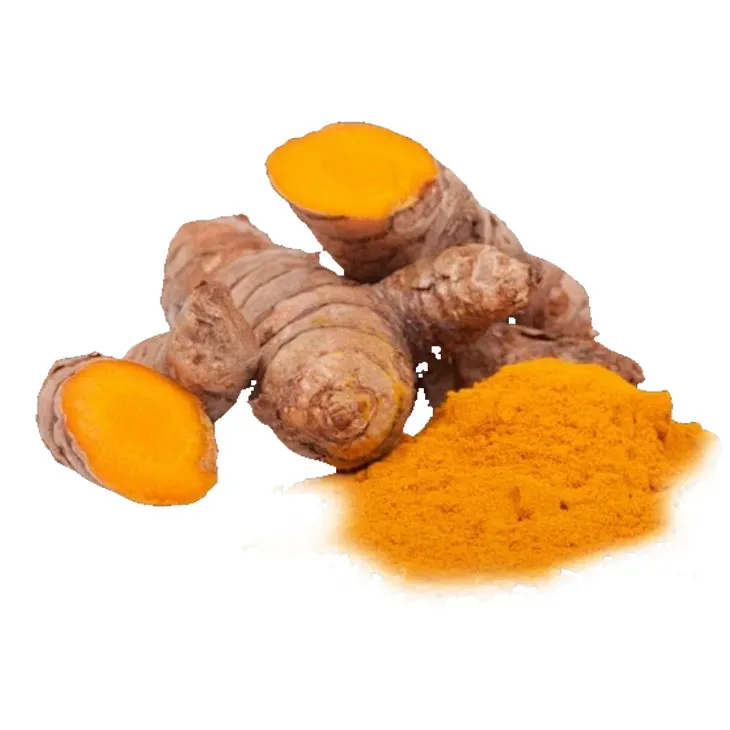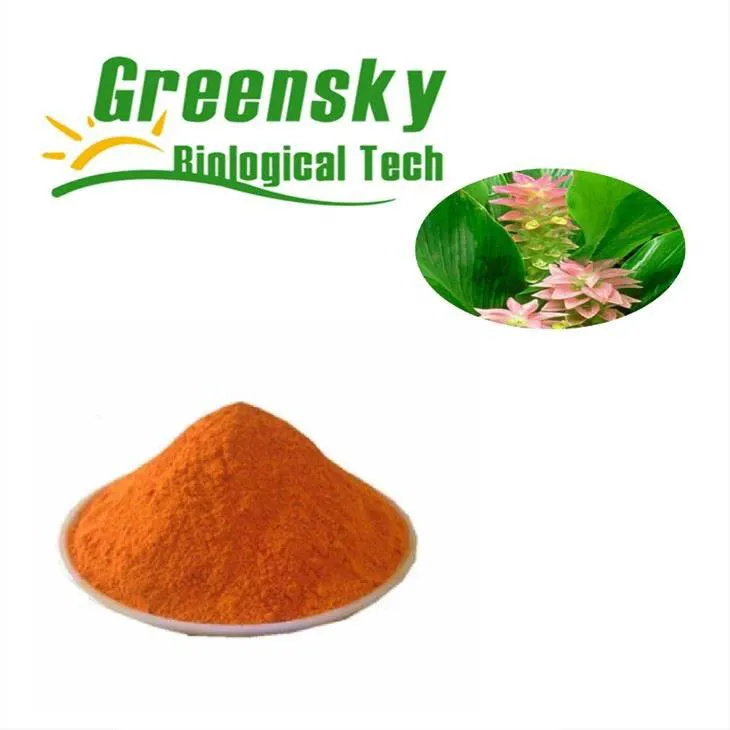- 0086-571-85302990
- sales@greenskybio.com
8 Effects of Curcumin on Skin Glow.
2024-11-12

1. Introduction to Curcumin
Curcumin is a natural compound that is derived from the turmeric plant. It has been used for centuries in traditional medicine for its various health - promoting properties. In recent years, its potential benefits for the skin have been increasingly recognized. This yellow - colored pigment is not only a key ingredient in many Asian cuisines but also a powerful agent when it comes to skin health.

2. Promotion of Collagen Production
Collagen is a vital protein that provides structure and elasticity to the skin. As we age, collagen production declines, leading to wrinkles and sagging skin. Curcumin has been found to stimulate the fibroblasts in the skin, which are the cells responsible for producing collagen. By enhancing collagen synthesis, curcumin helps to keep the skin firm and youthful.
Studies have shown that curcumin can activate certain signaling pathways in the fibroblasts that lead to increased collagen production. This is a significant advantage as it can potentially reverse some of the signs of skin aging.

3. Anti - Inflammatory Properties
The skin is constantly exposed to various environmental factors that can cause inflammation, such as UV radiation, pollutants, and allergens. Inflammation in the skin can lead to redness, swelling, and various skin disorders.
Curcumin has powerful anti - inflammatory properties. It can inhibit the production of inflammatory mediators such as cytokines and prostaglandins. By reducing inflammation, curcumin can soothe irritated skin, reduce redness, and improve the overall appearance of the skin.
For example, in cases of acne, which is often associated with inflammation, curcumin can help to calm the inflamed skin, reducing the size and severity of pimples.

4. Antioxidant Activity
The skin is constantly under oxidative stress due to exposure to free radicals from sources like UV rays and pollution. Free radicals can damage skin cells, leading to premature aging, wrinkles, and a dull complexion.
Curcumin is a potent antioxidant. It can neutralize free radicals, protecting the skin cells from oxidative damage. This antioxidant activity helps to maintain the integrity of the skin cells, resulting in healthier and more radiant skin.
Moreover, by scavenging free radicals, curcumin can also prevent the breakdown of collagen and elastin in the skin, further contributing to skin firmness and elasticity.

5. Reduction of Blemishes
Blemishes on the skin, such as dark spots, hyperpigmentation, and acne scars, can be a major concern for many people. Curcumin can play an important role in reducing these blemishes.
For hyperpigmentation, curcumin inhibits the activity of tyrosinase, an enzyme involved in the production of melanin. By reducing melanin production, curcumin can help to lighten dark spots and even out skin tone.
In the case of acne scars, curcumin's ability to promote collagen production and its anti - inflammatory properties can help to repair the damaged skin tissue, gradually reducing the appearance of scars.

6. Moisturizing the Skin
Proper skin hydration is essential for a healthy and glowing complexion. Curcumin can help to improve the skin's moisture - retaining ability.
It can strengthen the skin's barrier function, preventing water loss from the skin. This helps to keep the skin hydrated and supple. A well - hydrated skin appears plump and has a natural glow.
Some skincare products containing curcumin are formulated to provide long - lasting moisture to the skin, making it an ideal ingredient for those with dry or dehydrated skin.
7. Protection Against UV Damage
Exposure to UV radiation from the sun is one of the major causes of skin damage, including sunburn, premature aging, and an increased risk of skin cancer.
While curcumin cannot replace sunscreen entirely, it can offer some level of protection against UV damage. It can absorb certain wavelengths of UV light and also has antioxidant and anti - inflammatory properties that can help to mitigate the harmful effects of UV radiation on the skin.
However, it is important to note that using sunscreen in combination with curcumin - containing products can provide more comprehensive protection for the skin.
8. Improving Skin Microcirculation
Good blood circulation in the skin is crucial for delivering nutrients and oxygen to the skin cells and removing waste products. Curcumin can improve skin microcirculation.
By dilating blood vessels in the skin, curcumin allows for better blood flow. This can result in a healthier complexion as the skin cells receive the necessary nutrients for optimal function. Improved microcirculation can also give the skin a rosy glow.
9. How to Incorporate Curcumin into Your Skincare Routine
There are several ways to include curcumin in your skincare routine:
- Topical application: Look for skincare products such as creams, serums, and masks that contain curcumin. These products can be applied directly to the skin to reap its benefits.
- Oral consumption: Consuming curcumin supplements or adding turmeric (which contains curcumin) to your diet can also have a positive impact on skin health. However, it is important to consult a healthcare provider before starting any new supplement regimen.
10. Conclusion
Curcumin offers a wide range of benefits for the skin, from promoting collagen production to protecting against UV damage. Incorporating curcumin into your skincare routine, either through topical products or dietary intake, can help you achieve healthy and glowing skin. However, it is always important to be aware of any potential allergies or interactions and to consult a professional if you have any concerns.
FAQ:
What is curcumin?
Curcumin is a natural compound that is found in the spice turmeric. It has antioxidant, anti - inflammatory, and other beneficial properties.
How does curcumin promote collagen production?
Curcumin can stimulate fibroblasts, which are cells in the skin that are responsible for producing collagen. By promoting the activity of these cells, curcumin helps to increase collagen levels in the skin.
Can curcumin really reduce blemishes?
Yes, curcumin has anti - inflammatory properties that can help to reduce redness and inflammation associated with blemishes. It may also have antibacterial effects that can prevent the formation of new blemishes.
Is curcumin safe for all skin types?
While curcumin is generally considered safe for most people, those with sensitive skin may experience some irritation. It is always a good idea to do a patch test before using any new product containing curcumin on your skin.
How can I incorporate curcumin into my skincare routine?
You can look for skincare products that contain curcumin, such as creams, serums, or masks. You can also try adding a small amount of turmeric (which contains curcumin) to your homemade face masks or scrubs.
Related literature
- The Role of Curcumin in Skin Health: A Review"
- "Curcumin and Its Impact on Skin Aging"
- "Beneficial Effects of Curcumin on Skin Disorders"
- ▶ Hesperidin
- ▶ Citrus Bioflavonoids
- ▶ Plant Extract
- ▶ lycopene
- ▶ Diosmin
- ▶ Grape seed extract
- ▶ Sea buckthorn Juice Powder
- ▶ Fruit Juice Powder
- ▶ Hops Extract
- ▶ Artichoke Extract
- ▶ Mushroom extract
- ▶ Astaxanthin
- ▶ Green Tea Extract
- ▶ Curcumin
- ▶ Horse Chestnut Extract
- ▶ Other Product
- ▶ Boswellia Serrata Extract
- ▶ Resveratrol
- ▶ Marigold Extract
- ▶ Grape Leaf Extract
- ▶ New Product
- ▶ Aminolevulinic acid
- ▶ Cranberry Extract
- ▶ Red Yeast Rice
- ▶ Red Wine Extract
-
Passionflower Extract
2024-11-12
-
Carrageenan Extract Powder
2024-11-12
-
Pine bark Extract Powder
2024-11-12
-
Tongkat Ali Extract Powder
2024-11-12
-
Aguaje Extract
2024-11-12
-
Withania Somnifera Extract
2024-11-12
-
Jujube Extract
2024-11-12
-
Quercetin
2024-11-12
-
Bilberry Extract
2024-11-12
-
Longan Extract
2024-11-12





















